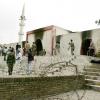Cyberterrorism: The Reality of Virtual Warfare in India
Conceptually speaking terrorism is a dynamic concept and India being one of the oldest victims of terrorism has witnessed many facets of it.As India increasingly goes online, the dangers posed by Internet terrorism are beginning to escalate. Cyberterrorism in India has now grown in to an extremely dynamic phenomenon which is not easy to track. Jaipur, Bangalore and Ahmedabad; almost all the terrorist attacks on the Indian soil in recent past have established an e-connection; a dangerous nexus between the virtual world and the real terrorists.








